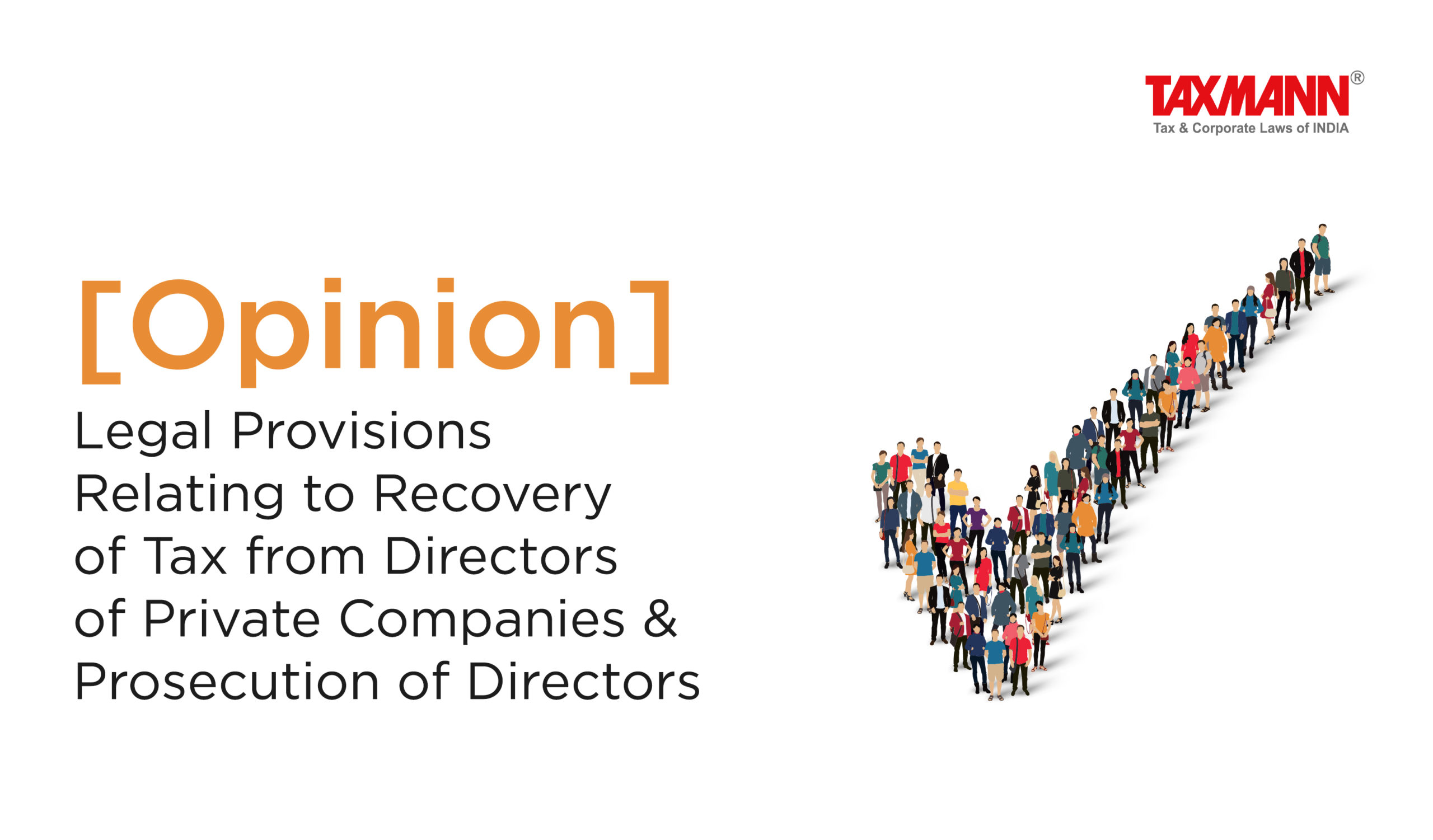[Opinion] Legal Provisions Relating to Recovery of Tax from Directors of Private Companies & Prosecution of Directors
- Blog|News|Income Tax|
- 3 Min Read
- By Taxmann
- |
- Last Updated on 4 September, 2023

CA V K Subramani – [2023] 154 taxmann.com 26 (Article)
Payment of correct amount of tax on the income by the taxpayers is what the Government expects but the realities are somewhat different. The taxpayers pay tax on the income admitted by them and the issues surrounding the term ‘income’ is the bone of contention which always eludes consensus among the stakeholders. Once ‘tax arrears’ is determined by the Department it becomes a definite headache for the taxpayer to get it knocked off by payment of such amount or through appellate order for its strike off. Nowadays, even meagre amounts of arrear when promptly paid by the taxpayers the tax arrears continue to stare at them for the reasons best to known to CPC and the Department. It has become a wise move, not to pay the arrears of tax but make excess payment of tax in the subsequent assessment year to result in refund so that the arrears of tax are adjusted by the CPC itself. This seems to be an effective remedy instead of paying the tax demand and being upset that the arrear is not cancelled despite payment. However, this approach would entail interest cost @12% per annum which the assessee can afford considering the certainty of arrears of tax being adjusted by the CPC without any effort for its removal by the taxpayers.
In this background of such docile work culture, the taxpayers are directed to pay 20% of the demand before preferring appeal against the assessment with a caveat that in the case of high-pitched assessment it may be waived subject to conditions contained therein. (Refer CBDT Office Memorandum No. 404/72/93 -ITCC dt.29-2-2016; Flipkart India (P.) Ltd. v. Asstt. CIT [2017] 79 taxmann.com 159/248 Taxman 555/396 ITR 551 (Kar.); Dabur India Ltd v. CIT (TDS) [2023] 146 taxmann.com 315/291 Taxman 3 (Delhi); and Paulson Litho Works v. ITO [1994] 76 Taxman 294/208 ITR 676 (Mad).
Recently, Gujarat High Court in Devendra Babulal Jain v. ITO [2023] 450 ITR 520 (Guj.) and Delhi High Court in the case of Vipul Aggarwal v. ITO [2022] 143 taxmann.com 237/289 Taxman 474/[2023] 450 ITR 254 dealt with recovery of tax from the directors when it is due from the private companies and the prosecution of directors respectively.
Liability of directors of private company-section 179
This section starts with a non-obstante clause by stating that notwithstanding anything contained in the Companies Act, 2013 where any tax is due from a private company in respect of any previous year and it could not be recovered, then, every person who was a director of the private company at any time during the previous year to which the tax demand relates shall be jointly and severally liable for payment of such tax. However, if such director proves that the non-recovery cannot be attributed to any gross neglect, misfeasance or breach of duty on his part in relation to the affairs of the company, he shall not be liable for the tax arrears.
Even where a private company is converted into a public company and the tax arrears relate to the period i.e. previous year when it was a private company, the provisions of this section would apply for recovery of tax.
The amount of tax arrears would include penalty, interest, fees or any other sum payable under the Act. In the light of this legal provision, let us see how the Gujarat High Court decided Devendra Babulal Jain’s case (supra).
Click Here To Read The Full Article
Disclaimer: The content/information published on the website is only for general information of the user and shall not be construed as legal advice. While the Taxmann has exercised reasonable efforts to ensure the veracity of information/content published, Taxmann shall be under no liability in any manner whatsoever for incorrect information, if any.

Taxmann Publications has a dedicated in-house Research & Editorial Team. This team consists of a team of Chartered Accountants, Company Secretaries, and Lawyers. This team works under the guidance and supervision of editor-in-chief Mr Rakesh Bhargava.
The Research and Editorial Team is responsible for developing reliable and accurate content for the readers. The team follows the six-sigma approach to achieve the benchmark of zero error in its publications and research platforms. The team ensures that the following publication guidelines are thoroughly followed while developing the content:
- The statutory material is obtained only from the authorized and reliable sources
- All the latest developments in the judicial and legislative fields are covered
- Prepare the analytical write-ups on current, controversial, and important issues to help the readers to understand the concept and its implications
- Every content published by Taxmann is complete, accurate and lucid
- All evidence-based statements are supported with proper reference to Section, Circular No., Notification No. or citations
- The golden rules of grammar, style and consistency are thoroughly followed
- Font and size that’s easy to read and remain consistent across all imprint and digital publications are applied



 CA | CS | CMA
CA | CS | CMA
